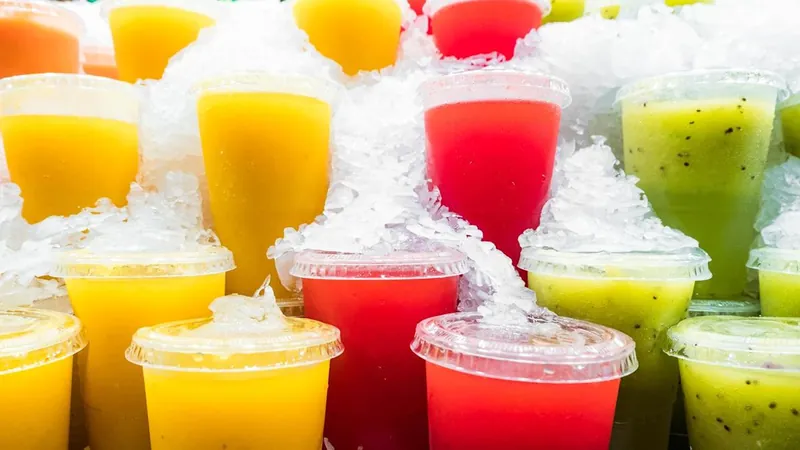
Avoid These Common Drinks to Boost Your Health—You’ll Thank Us Later!
2025-04-01
Author: Chun
It's easy to overlook how much our drink choices can impact our daily calorie and sugar intake. Many beverages that seem healthy, like protein shakes or fruit juices, may not be as beneficial as they appear. Nutrition experts warn that unsuspecting drinks can pack a surprising amount of sugar, which can be a significant health concern.
Not all sugars are created equal. Added sugars, which include cane sugar, brown sugar, high fructose corn syrup, and natural sweeteners like maple syrup or honey, contribute to excess calorie consumption. "Even naturally occurring sugars found in whole foods, such as fruits, can be consumed in excess," says Stephani Johnson, a registered dietitian and nutrition expert.
The American Heart Association sets a guideline for added sugar intake: men should have no more than 36 grams, while women should limit it to 25 grams daily. The Dietary Guidelines for Americans recommend that added sugars should account for no more than 10% of your total daily calories. For instance, if you consume 2,000 calories a day, sugar shouldn’t contribute more than 200 calories to your diet.
Here are several popular drinks that you may want to reconsider or consume in moderation:
1. Fruit Juice
Often perceived as a "healthy" choice, fruit juice can be deceiving. Many juices contain little fruit and high fructose corn syrup, leading to a high sugar content—an 8-ounce serving can have up to 37 grams of sugar! Opt for whole fruits, which provide essential fiber, or consider diluting juice with water or carbonated water to keep sugar levels down.
2. Sweetened Iced Tea
Sweetened iced tea can be alarmingly high in sugar, with a standard 12-ounce serving containing between 27 and 35 grams of added sugar. Instead, try unsweetened teas or add fresh lemon or a splash of lemonade for a refreshing twist.
3. Sugary Coffee Drinks
Sweetened coffee drinks can have a staggering 12 to 60 grams of sugar per serving. It's best to switch to unsweetened plant-based milk or simply use a natural sweetener like stevia to cut sugar while enjoying your coffee fix.
4. Soda
Soda is perhaps the most notorious sugary drink, often containing more sugar than the daily limit in just one can. High fructose corn syrup, a common sweetener in sodas, is linked to several health issues, including obesity and fatty liver disease. If you're craving fizz, opt for seltzer with a splash of juice instead!
5. Sweetened Plant-Based Milk
Many sweetened nut milks contain minimal protein and fiber but can pack 5 to 17 grams of sugar. Choose unsweetened variants to maintain lower sugar levels while still enjoying a dairy alternative.
6. Pre-Mixed Alcoholic Drinks
These drinks can be sugar bombs, containing up to 40 grams of sugar per serving. Opt for sugar-free options or mix drinks using fresh fruit and herbs instead of sugary mixers.
7. Pre-Made Smoothies
While they can be convenient, pre-made smoothies often contain high sugar levels due to added syrups and sugars. Making your own smoothies allows you to manage ingredients better, keeping them nutritious without excess sugar.
8. Pre-Made Protein Drinks
Pre-made protein drinks can vary widely in sugar content but are often less sugary than other beverages because they may use artificial sweeteners. For more control over sugar and ingredients, try crafting your own protein shakes at home using protein powder, fruits, and even veggies like spinach.
9. Energy Drinks
High in both sugar (30-40 grams) and caffeine (up to 300 mg), energy drinks can be more harmful than helpful for your health. Instead, a cup of black coffee can provide the energy boost without the excessive sugar.
10. Sports Drinks
While formulated to replenish lost fluids and electrolytes during intense exercise, sports drinks can have around 30-40 grams of sugar in a single serving. For moderate activities, water is typically the best choice to stay hydrated.
Conclusion
By being mindful of your drink choices and opting for healthier alternatives, you can significantly reduce your daily sugar intake, improve your overall health, and contribute to your wellness goals. Make these small adjustments, and you'll likely notice a difference in how you feel. Cheers to better health!




 Brasil (PT)
Brasil (PT)
 Canada (EN)
Canada (EN)
 Chile (ES)
Chile (ES)
 Česko (CS)
Česko (CS)
 대한민국 (KO)
대한민국 (KO)
 España (ES)
España (ES)
 France (FR)
France (FR)
 Hong Kong (EN)
Hong Kong (EN)
 Italia (IT)
Italia (IT)
 日本 (JA)
日本 (JA)
 Magyarország (HU)
Magyarország (HU)
 Norge (NO)
Norge (NO)
 Polska (PL)
Polska (PL)
 Schweiz (DE)
Schweiz (DE)
 Singapore (EN)
Singapore (EN)
 Sverige (SV)
Sverige (SV)
 Suomi (FI)
Suomi (FI)
 Türkiye (TR)
Türkiye (TR)
 الإمارات العربية المتحدة (AR)
الإمارات العربية المتحدة (AR)